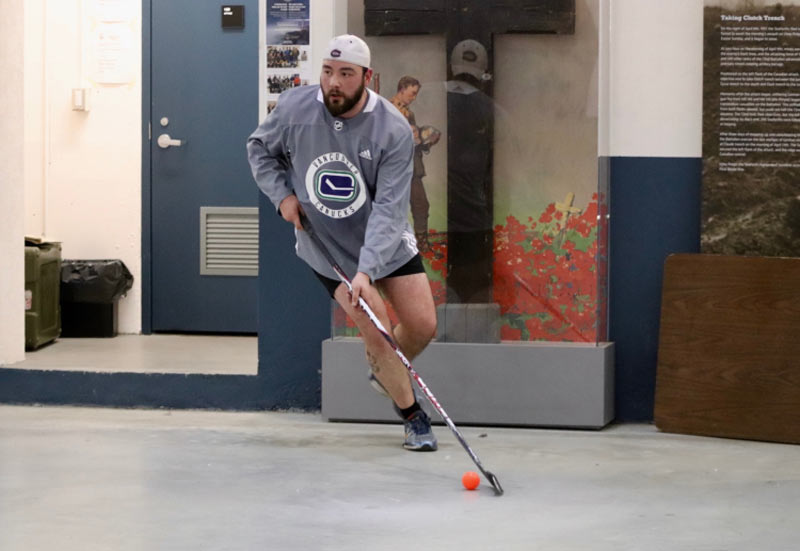
[passprogram.ca]
Good things come to those who sweat!”
The sentiment has been celebrated by both fitness gurus and health nuts for years, becoming a quote printed on T-shirts, wall decals and bumper stickers.
And while some might get tired of the kitschy cuteness of the “healthy body, healthy mind” tagline, there’s more truth to this trope than you might think. One University of British Columbia researcher decided to capitalize on it for the benefit of Canadian Armed Forces members and veterans, laying the framework for a new type of military health intervention.
Specializing in sport, exercise and performance psychology, Mark Beauchamp ran a pilot study in Vancouver called “Purpose After Service through Sport,” or PASS, from September to March 2020. The program sought to use team sports as a way for active and retired military members to better transition to civilian life and promote social connectivity and healthy lifestyles.
And the sport to do this? Ball hockey.
“It’s just turn up, sweat, socially connect and have fun,” said Beauchamp.
On any given night, self-refereed games of 10-20 players were held in a local armoury. Lasting about 45-60 minutes, the game was followed by refreshments in the mess, where CAF members bonded over ice-cold drinks.
The program’s design seemed almost too simple. After all, it’s just a game and a hang with a beer—isn’t that what most Canadian weekends consist of? How was this supposed to benefit military members?
Well, beneath PASS’s seeming simplicity, a constellation of scientific fact bears its makeup, showing exercise to be vital to mind-body wellness. For instance, a 2022 review found that out of the nearly 1,300 experimental studies conducted on the effects physical activity has on mental health in the preceding 12 years, 89 per cent of them recorded a significantly positive relationship.
From the studies surveyed, the report surmised that 30-45 minutes of exercise three to five times per week delivered the greatest mental health benefits, with those who engaged in team sports reporting 20 per cent fewer “poor mental health days” each month.
Such scientific phenomena were essential to initiating PASS.
“[The data is] quite consistent now around the benefits of physical activity,” said Beauchamp.
This data came alongside Beauchamp’s team noticing that the transition back to civilian life can be especially difficult for CAF members. Losing military identity and the daily structure cultivated in basic training and combat, many struggle with their new-found autonomy, leading to a host of mental challenges that are often exacerbated by issues with maintaining social connections and employment.
This is further compounded by a disconnect in the use of government-funded veteran health programs. A survey from 2010 found that a whopping 39 per cent of CAF members with mental health conditions were not receiving available services from Veterans Affairs Canada.
Since substantial evidence indicates that exercise and group identity correlate with boosting mental wellness and providing individuals with a sense of purpose, Beauchamp decided to create a military-specific program, inspired by the veterans he spoke with at his campus.
“After transitioning out of the military…some [veterans] struggle,” said Beauchamp.
A self-described “army brat” whose father served in the British army for 30 years, Beauchamp noted “you have some sense as to what army life is like.”
PASS, however, was one of the first military exercise initiatives open to all veterans, not just those who were wounded or sick. And to Beauchamp, bringing individuals who share the same military experience into a pro-team, pro-military environment—ball hockey in an armoury—could create a sense of community and camaraderie many CAF members otherwise lacked in their daily lives.
“They come together on a sports field playing ball hockey,” said Beauchamp. “There’s this immediate sense that they’re talking the same language. They understand one another because they know what it’s like to serve in the military.”
The results were promising. PASS participants reported a boost in their mental health, with one telling study interviewers, “you’re doing something collectively and kinda suffering together which helps build/forge bonds and friendships.”
Many participants really liked the way it simulated military structure, as well, with another commenting, “the army is kinda similar to [PASS], so it’s kind of like a work-hard, play-hard mentality….”
PASS also became a conduit for participants to learn about other veteran health programs and healthy habits.
“I think it sort of destigma-
tized ,” said Beauchamp.
Seeing the overwhelmingly positive response to PASS, Beauchamp had sought to restart the program after the pandemic and even received monetary support from VAC’s Veteran and Family Well-Being Fund in 2021 to begin a multi-provincial, six-month initiative to bring hundreds of CAF members into sports this year. The fully fleshed out PASS program, taking the form of a multi-phase, randomized study, never reached fruition, however, and the grant was returned.
“We simply weren’t able to reach sufficient numbers to run the study,” said Beauchamp.
Still, those who worked on PASS believe it was worthwhile. Other veteran-health services such as Soldier On, a similar initiative, have used PASS’s findings to strengthen their own programs.
“There are [sports-based] programs out there,” said Beauchamp, and “these programs can help veterans.”
More importantly, though, Beauchamp believes there’s plenty left to explore regarding the benefits of physical activity for military wellness.
“We need to be open and listen,” he said. “It’s up to us as a community to see how we can best support [our veterans].”
Advertisement





















